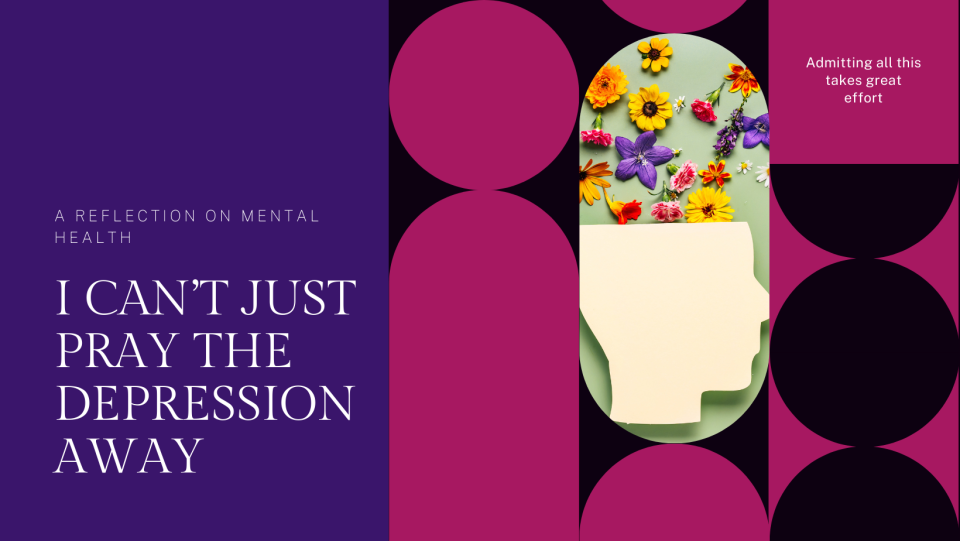The hardest words to say are “I’m sorry.” Admitting our mistakes requires humility, self-awareness and vulnerability. Read any online comment section or social media post and you’ll see how hard it is for people to admit they were wrong about something.
Just as difficult is acknowledging when we need help. Like admitting fault, confessing we can’t do something on our own also requires vulnerability. Children are quicker than many adults to say, “I need help.” Somehow, as we age, vulnerability transforms into shame or weakness. Too often we admit we need help when we’ve exhausted every other option or when we see others pave a path out of our shame.
As a sixth grader, entering the turbulent years of adolescence, I seldom asked for help. Like most of my peers, I aspired for independence. But my mother still recalls the moment when she and the rest of my family knew something was wrong with me. Offhandedly, without realizing that someone nearby could hear me, I muttered my confession that I would’ve been better off if I had never been born. These words, which so terrified my family, sprang not from anger, as when a child storms off after being grounded, but from the weight of the world in my mind.
Outwardly I seemed like any other 10-year-old, playing in the orchestra, competing (poorly) in sports, reading voraciously and spending time with my friends. Inwardly, I struggled to keep my mind from wandering into dark places, thinking about my own death, dwelling on what everyone thought of me. Distinguishing the real from the imaginary may come easily when reading a fantasy novel, but distinguishing a true friend from a false one is incredibly hard, particularly when your mind keeps telling you the world is against you.
This was in 1990 in Oklahoma, a time when the phrase mental health seemed as alien as visiting Mars. To the average person you either belonged in a hospital or were just a little sad. Folks lost jobs and other opportunities because of depression. People didn’t ask, “Are you seeing a therapist?” They said, “You just need to get outside more, enjoy that sunshine” or “You’re not praying hard enough. God will take care of you if you have the right faith.” I did see a therapist, though I never admitted that to anyone. Even in therapy I didn’t readily disclose the turmoil going on in my head.
These labels don’t define me, nor will I let them. Instead I embrace them, remembering that everyone has a place at God’s table.
My therapist resorted to board games, an exercise in distraction that pried open the lid on my inner turmoil. Even today I need incredible energy to be so vulnerable, with others or with my current therapist. I don’t want to hear that I need to pray or go outside. I don’t want to spend time explaining that I’m not seeking attention or that nothing traumatic happened to me. I heard all that in high school, and none of it rang true.
That struggle continues today because we so often hear about mental health as a short-term situation. A social media influencer will post that they are not OK because of the pandemic or the economy or a loved one leaving. Other people will say they get their therapy from shopping, reading, bowling, target shooting (someone told me this personally), spending time with friends—you name it. None of that is therapy. It may be a form of self-care or of detaching oneself from a stressful situation, but it’s not therapy. Depression cannot be cured by a day at the beach any more than a broken leg can be cured by binge-watching Davey and Goliath. These are nice things and may temporarily alleviate whatever ails you, but neither directly addresses the problem with the tools needed for long-term healing (therapy and a cast, respectively).
Admitting all this takes great effort. Telling someone that I’m not just sad, or that without professional help I’d likely not be here, requires more than trust. It means facing my fear of isolation, stigma and living with labels. When Presiding Bishop Elizabeth Eaton spoke about Mental Health Awareness Month, her words highlighted the same battles I have been enduring, reminding me that I’m not alone. Millions of others navigate this ocean of mental illness, bracing themselves as the waves crash and navigating as best they can when the waters grow calm. Still, the voices of others, telling me how I should live with these labels, ring out. I don’t know what I can do to stop them from deciding how best I should live my life.
These labels don’t define me, nor will I let them. Instead I embrace them, remembering that everyone has a place at God’s table. Whether I talk about my vulnerabilities, my illnesses or my brokenness, I will never need to explain myself to a Creator who loves us without exception and who celebrates the parts of us that make us whole children of God.





